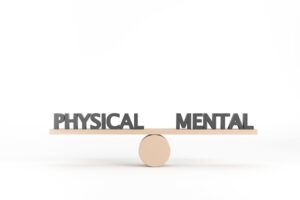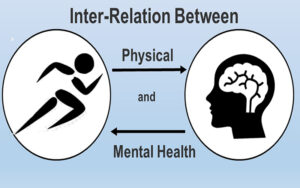Unveiling the Link Between Physical Well being and Mental Wellness
Once upon a time in a bustling city, there lived a man named Alex. Alex was a hard-working accountant who spent most of his days sitting at a desk, crunching numbers, and dealing with the pressures of deadlines. While Alex loved his job, he often found himself feeling stressed, anxious, and physically unwell. He couldn’t quite understand why his mind and body seemed to be in constant turmoil.
One rainy afternoon, Alex met his friend Emma for coffee. Emma was a personal trainer and nutritionist who had always been passionate about health and well-being. As they sipped their lattes, Alex confided in Emma about his struggles.
“Emma,” Alex began, “I feel like I’m constantly stressed and tired. I can’t focus at work, and my back pain is getting worse. Do you think these issues could be connected?”
Emma nodded thoughtfully. “Absolutely, Alex. There’s a strong connection between physical and mental health. Our bodies and minds are deeply intertwined, and when one is out of balance, the other often follows.”
Intrigued, Alex asked Emma to explain more about this connection.
Understanding the Mind Body Connection
Emma explained that the relationship between physical and mental health is bidirectional. This means that physical health can affect mental well-being and vice versa. For instance, chronic physical conditions such as heart disease or diabetes can lead to feelings of depression and anxiety. Similarly, mental health disorders like depression can result in physical symptoms such as fatigue, headaches, and digestive issues.
“Stress is a perfect example,” Emma continued. “When you’re stressed, your body releases hormones like cortisol and adrenaline. These hormones prepare your body for a ‘fight or flight’ response, but if stress becomes chronic, it can lead to physical health problems such as high blood pressure, weakened immune system, and muscle tension.”
Alex was beginning to see the connection. “So, my back pain and stress might be related?”
“Exactly,” Emma replied. “When you’re stressed, your muscles tense up, which can cause or exacerbate back pain. Plus, sitting for long periods without proper posture can make things worse. It’s a cycle where physical and mental health issues feed into each other.”
Alex’s Journey to Better Health
Determined to break the cycle, Alex asked Emma for advice on improving both his physical and mental health. Emma was eager to help and outlined a comprehensive plan that addressed various aspects of well-being.
1. Incorporating Physical Activity
“Exercise is one of the best ways to improve both physical and mental health,” Emma explained. “It releases endorphins, which are natural mood lifters, and helps reduce stress.”
Emma suggested that Alex start with simple activities like walking or stretching. “You don’t have to run a marathon,” she said with a smile. “Even a 30-minute walk each day can make a big difference.”
Alex decided to walk to work instead of taking the bus. The fresh air and morning sunlight lifted his spirits, and he noticed that his back pain began to diminish as his posture improved.
2. Eating a Balanced Diet
“Nutrition plays a crucial role in how we feel physically and mentally,” Emma continued. “Eating a balanced diet with plenty of fruits, vegetables, lean proteins, and whole grains can boost your energy levels and improve your mood.”
Alex realized that his diet was often filled with quick, unhealthy meals and sugary snacks. With Emma’s guidance, he started meal prepping on Sundays, making healthy lunches and snacks for the week. He found that his energy levels stabilized, and he felt more focused at work.
3. Practicing Mindfulness and Relaxation Techniques
“Stress management is key,” Emma emphasized. “Practices like mindfulness, meditation, and deep breathing can help you manage stress and improve mental clarity.”
Emma introduced Alex to mindfulness meditation, a practice where one focuses on the present moment without judgment. Alex began to set aside 10 minutes each morning for meditation. At first, it was challenging, but with practice, he found it became easier to clear his mind and start the day with a sense of calm.
4. Prioritizing Sleep
“Good sleep is essential for both physical and mental health,” Emma said. “Aim for 7-9 hours of quality sleep each night.”
Alex admitted that he often stayed up late working or watching TV. Emma suggested creating a bedtime routine to wind down, such as turning off electronic devices an hour before bed, reading a book, or taking a warm bath. Alex found that these changes helped him fall asleep faster and wake up feeling more refreshed.
5. Seeking Professional Help When Needed
Emma also advised Alex not to hesitate to seek professional help if needed. “Sometimes, talking to a therapist or counselor can provide valuable support and strategies for managing stress and mental health issues.”
Alex appreciated this advice and decided to schedule an appointment with a therapist to explore his anxiety and stress further.

The Transformation
As weeks turned into months, Alex noticed remarkable changes in his life. His back pain lessened, his energy levels soared, and his stress became more manageable. He felt happier, more focused, and more in control of his life. The connection between his physical and mental health became clearer with each passing day.
One evening, Alex reflected on his journey. He realized that taking care of his physical health had a profound impact on his mental well-being, and vice versa. By integrating regular exercise, a balanced diet, mindfulness practices, good sleep hygiene, and professional support, he had created a holistic approach to health that nurtured both his body and mind.
Sharing His Story
Inspired by his transformation, Alex decided to share his story with his colleagues at work. During a team meeting, he spoke openly about his struggles with stress and physical pain and how addressing both his physical and mental health had made a significant difference.
“Many of us face similar challenges,” Alex said. “I encourage you all to take small steps towards better physical and mental health. It can be as simple as taking a walk during lunch, eating a healthier meal, or practicing mindfulness. The benefits are truly life-changing.”
His story resonated with many of his colleagues, who began to adopt some of his strategies. The office atmosphere improved as more people started prioritizing their well-being, leading to a happier and more productive workplace.
Conclusion
Alex’s journey highlights the profound connection between physical and mental health. By understanding and addressing this connection, we can improve our overall well-being and lead more fulfilling lives. Whether it’s through exercise, nutrition, mindfulness, sleep, or professional support, there are many ways to nurture both our bodies and minds.
Remember, small changes can lead to significant improvements. Just like Alex, you too can embark on a journey towards better health and discover the incredible benefits of a balanced and holistic approach to well-being.

